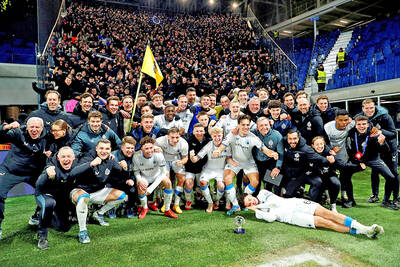World Cup champions South Africa yesterday gave the Wallabies a harsh reality check, leading 14-0 early and beating Australia 33-7 in the opening Rugby Championship match.
South Africa led 7-0 in the 10th minute when captain Siya Kolisi crashed over the try line from a rolling maul to give the visitors the lead before a capacity crowd of more than 50,000 at Suncorp Stadium in Brisbane.
“We said as a group this is a big game for us to win, I am proud of the boys,” Kolisi said. “We stuck to what we planned in the week, we are a learning team.”

Photo: EPA-EFE
Despite sustained strong defensive play by the Wallabies, South Africa went ahead 14-0 when Pieter-Steph du Toit found an opening to surge through for the second try.
Another try gave the Springboks a 21-0 lead at halftime and the home side never recovered — despite Wallabies assistant coach Laurie Fisher’s optimistic comments at halftime.
“That’s a lot of heavy artillery coming at you,” Fisher said. “So we’ve just got to dust ourselves off, get out in the second half and just win it moment by moment.”
That never happened.
The Springboks went ahead 28-0 with 13 minutes left after their fourth try of the night then added a fifth on the ensuing kick-off.
The Wallabies got on the scoreboard with four minutes remaining.
It was the Springboks’ first win over Australia in Brisbane since 2013.
Later, in Wellington, Argentina stunned New Zealand with a 38-30 win as they outscored the All Blacks four tries to three in a setback to the hosts’ defense of their title.
It was only the third win for the Pumas over New Zealand in 38 meetings as the adventurous spirit of the visitors prevailed against an error-prone All Blacks side.
The lead changed several times before Argentina prevailed.
Argentina’s tries came from Lucio Cinti, Mateo Carreras, Franco Molina and Agustin Creevy.
Additional reporting by Reuters

Taiwan kept its hopes of advancing to the 2026 World Baseball Classic (WBC) alive with a 9-1 victory over South Africa in a qualifier at the Taipei Dome last night, backed by solid pitching. Bouncing back from Friday’s struggles on the mound, when Taiwanese pitchers surrendered 15 runs to Spain, Team Taiwan kept the visiting team in check, allowing just one run in the bottom of the fourth inning. The win was crucial for Taiwan, as a loss would have eliminated the team from contention for the next WBC. Starting pitcher Sha Tzu-chen (沙子宸) struck out one and allowed no hits, except for

The Chinese Professional Baseball League (CPBL) is considering reducing its pitch clock by two seconds to help players better adjust to the rules applied at the World Baseball Classic (WBC). The proposal aims to shorten the pitch timer from 25 seconds to 23 seconds with the bases empty, and from 20 seconds to 18 seconds with runners on base. Currently, the WBC mandates that pitchers deliver a pitch every 18 seconds with the bases empty and 15 seconds with runners on base. The issue was raised during a pre-season CPBL managers’ meeting on Tuesday by Rakuten Monkeys bench and batting

‘SETTING THE TONE’: Donovan Mitchell said that their determination to dominate had nothing to do with past results, but was about a potential post-season clash The Cleveland Cavaliers on Friday boosted their NBA-best record with a 142-105 romp past the New York Knicks, tightening their grip on the Eastern Conference lead with an all-around dominant display. Donovan Mitchell scored 27 points to lead six Cavs players to score in double figures, connecting on five of seven three-pointers as Cleveland drilled 19 from beyond the arc. “I think the biggest thing was just try to set the tone early,” Mitchell said, adding that the determination to dominate had nothing to do with the Knicks’ first-round playoff win over the Cavs two seasons ago and everything to do with

BELGIANS ADVANCE: Club Brugge gave Atalanta a lesson in efficiency, as Gian Piero Gasperini’s team had 29 efforts at goal, compared with seven from the visitors Seldom has a player’s sending off had such an influence on a game. AC Milan was to left rue Theo Hernandez’s second yellow card — for diving — as Feyenoord advanced to the UEFA Champions League last 16 at the former European champion’s expense with a 1-1 draw in the second leg of their playoff on Tuesday, giving the Dutch team a 2-1 win on aggregate. Bayern Munich, Club Brugge and Benfica also won their playoffs, eliminating Celtic, UEFA Europa League winner Atalanta BC and French team AS Monaco respectively. “In soccer everything changes in a second,” said Milan forward